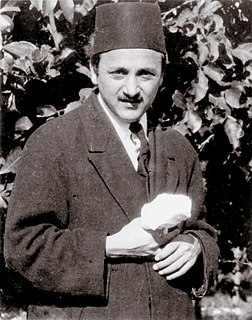A Quote by Sophocles
Knowledge must come through action. You can have no test which is not fanciful, save by trial.
Related Quotes
It is not sufficient to pray diligently for guidance, but this prayer must be followed by meditation as to the best methods of action and then action itself... because prayers can only be answered through action and if someone's action is wrong, God can use that method of showing the pathway which is right.
Every trial a man goes through, if he is faithful in that trial and does honor to God and his religion he has espoused, at the end of that trial or affliction that individual is nearer to God, nearer in regard to the increase of faith, wisdom, knowledge and power, and hence is more confident in calling upon the Lord for those things he desires.
(there is) no other means of escaping from one's consciousness than to deny it, to look upon it as an organic disease of the terrestrial intelligence - a disease which we must endeavor to cure by an action which must appear to us an action of violent and willful madness, but which, on the other side of our appearances, is probably an action of health. ("Of Immortality")
The end of man is knowledge, but there is one thing he can't know. He can't know whether knowledge will save him or kill him. He will be killed, all right, but he can't know whether he is killed because of the knowledge which he has got or because of the knowledge which he hasn't got and which if he had it, would save him.
The dogmas of the quiet past are inadequate to the stormy present. The occasion is piled high with difficulty, and we must rise to the occasion. We cannot escape history. We will be remembered in spite of ourselves. The fiery trial through which we pass will light us down in honour or dishonour, to the last generation. We shall nobly save, or meanly lose, our last best hope of Earth.
We must make clear to the Germans that the wrong for which their fallen leaders are on trial is not that they lost the war, but that they started it. And we must not allow ourselves to be drawn into a trial of the causes of the war, for our position is that no grievances or policies will justify resort to aggressive war. It is utterly renounced and condemned as an instrument of policy.
Faith by its very nature must be tried, and the real trial of faith is not that we find it difficult to trust God, but that God's character has to be cleared in our own minds. Faith in its actual working out has to go through spells of unsyllabled isolation. Never confound the trial of faith with the ordinary discipline of life. Much that we call the trial of faith is the inevitable result of being alive.
Action is the activity of the rational soul, which abhors irrationality and must combat it or be corrupted by it. When it sees the irrationality of others, it must seek to correct it, and can do this either by teaching or engaging in public affairs itself, correcting through its practice. And the purpose of action is to enable philosophy to continue, for if men are reduced to the material alone, they become no more than beasts.
The knowledge we now consider knowledge proves itself in action. What we now mean by knowledge is information effective in action, information focused on results. Results are outside the person, in society and economy, or in the advancement of knowledge itself. To accomplish anything this knowledge has to be highly specialized.
We all know that each generation has its own test, the contemporaneous and current standard by which alone it can adequately judge of its own moral achievements, and that it may not legitimately use a previous and less vigorous test. The advanced test must indeed include that which has already been attained; but if it includes no more, we shall fail to go forward, thinking complacently that we have "arrived" when in reality we have not yet started.






































